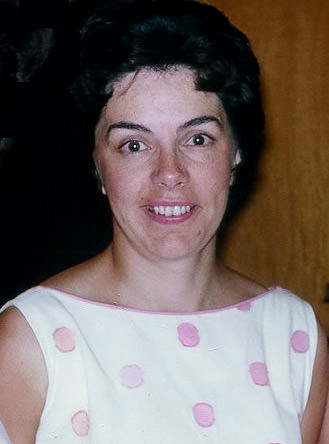
This week my mother, Beverley Anne Peterson, turns 80. She was born on February 6, 1939, in Naicam, Saskatchewan, a small, attractive, thriving prairie town, back when prairie towns were communities with a future. She was the third of four children, each separated by five years, preceded by her older brother, Earl, handsome, charming and reliable…
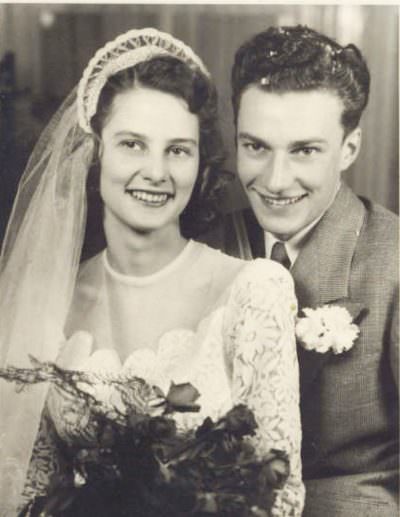
Joan, perfectionistic, nervous and talented…
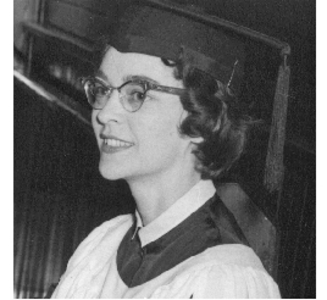
and followed by Margaret, an attractive combination of conscientiousness, caring, fun-loving and full of tricks (a picture of her later).
Her father, Frank Ponath, operated a successful car dealership and garage. This made the Ponaths one of the more well-off families by Naicam standards, with all the advantages and jealousies attendant upon that. She grew up on the right side of the tracks, and my grandmother a bit of a social climber was none too pleased when her third daughter was pursued by my father, Walter, smart, tough and good-looking, but not exactly of the right class. None of that mattered to Beverley, who pursued her own heart.
If my mother was a child in any manner similar to her adult self, then she was friendly, hospitable, caring for other people, honest, hard working and prone to instant fits of guilt if forced even temporarily into leisurely inaction. She had a very good sense of humor, and loved to laugh and tease. She was empathic, perhaps to a fault, although it was and is also the case that she can stand up for herself when necessary. In old pictures, when she was a child and a teenager, she looks very straightforward and pretty and without pretension and I think that those who knew her then would agree. There is no hint of the cynicism and premature world-weariness and false maturity that seems too often to characterize young women today. She worried my grandmother a bit, being more independent and less immediately obedient than that easily worried lady would have liked, but I think that was a testament to her character, and no fault, even though she feels somewhat guilty about it to this day. I never saw her be anything but good to her mother, regardless (and she loved her father, who was a very good man—playful and funny like her— who died too early. She didn’t really know him, in the adult sense, and certainly regretted that, as well, after he was taken away from her).
I remember my mother and her sisters mostly in the styles in the Kennedy era, at least in my childhood memories. I think those memories forged my essential sense of what defined attractive femininity, of at least the Doris Day version. They dressed in dresses, and sometimes in veils, and often with hats, and sometimes with gloves. The opportunity to do so came at least once a week for Sunday church attendance, and my mother enjoyed that—if enjoyed is the right word. She liked to sing, and enjoyed the community interaction (she’s very extraverted and sociable), and felt what I think was both a moral and spiritual responsibility to consider the divine and the role of proper action in the world. My father was not an attender of church, and this was a source of some chronic sorrow on my mother’s part. I came along with her until I was about 13 when the trouble of convincing me to accompany her began to outweigh any possible joy she might have derived from it. Really, it wouldn’t have been such a sacrifice for me to continue to make her happy for the few years between early teenage life and when I left home, but that’s not the way that people of that age think, when each year seems to stretch out endlessly and without limit.
She stayed home with her kids until my younger brother went to school (I have two siblings, Bonnie, 18 months younger, and Joel, five years younger) while my father pursued a career as a teacher and vice-principal—an occupation which at that time and in Hines Creek, the small and isolated northern Albertan town 1500 miles away from their hometown my parents bravely moved to when they were first married, provided an income of sufficient magnitude to allow for such a luxury. They lived in a small apartment complex with a number of other young teachers with families, all of whom became life-long friends. It was de riguer at that point for young women to stay home with their children, which is not surprising, because it is a full-time job for someone. Furthermore, that period of life doesn’t last very long, not in the grander scheme of things, and I have seen that most people who miss it severely regret it. That doesn’t mean there are no exceptions. Regardless, she might have been more inclined than many to be happy about her home life with kids because she suffered through two miscarriages, before I was born, and had some difficulty with her subsequent pregnancies.
In any case, I remember my early childhood, insofar as I can remember it, as a happy time of life, not least because my mother loved me and was funny and easy to get along with and playful and grateful and hospitable. And she stayed my firm friend through adolescence, which I can’t imagine was particularly easy.
We moved away from Hines Creek in the mid-sixties, and went back to Saskatchewan, and then back to Alberta, where we settled in Fairview, another northerly community, only about 15 miles away from where we were originally. Mom stayed at home until my brother Joel enrolled in school. Then she went to work. She had trained as a nurse, but only practiced briefly. She worked, instead, at the library at our local college and, over a twenty-year period (a decently long career) ended up as the head librarian. She found the transition into the relatively competitive and masculine hierarchy of the college often difficult. She was not taken as seriously as might have been, given her competence, by her more disagreeable male colleagues, some of whom had a lot to learn about being civilized human beings. I know. I happened to have worked for one of them. She had to toughen up. This gave her panic attacks, upon occasion, and plenty of doubt, more frequently. But she bloody well stuck it out, and she stood her ground, and she gained the respect of the people she worked with, and she did a good job. She had to insist on her ambition, too, in the face of some opposition from my father, who felt that having a wife who had to (wanted to) work indicated that he wasn’t fully capable of taking care of his family. Old-fashioned as that might be, and however likely to be casually pilloried as sexist now, it did reflect his firm and admirable belief that it was his responsibility to ensure the economic viability of his family. There are worse flaws.
But he accustomed himself to it, and it was, overall, a good thing. Mom was too dutiful and inclined to work to manage staying at home after her kids had entered the world outside and wasn’t interested in a continual round of coffee and, potentially worse (although arguably more fun), alcohol. So she pursued a successful career while we finished elementary school and junior high and graduated and then for many years after that. She put up with my quasi-delinquent friends, without imposing her choices on me, and she and my father both let me experiment and make my own mistakes. I can’t imagine that was easy.
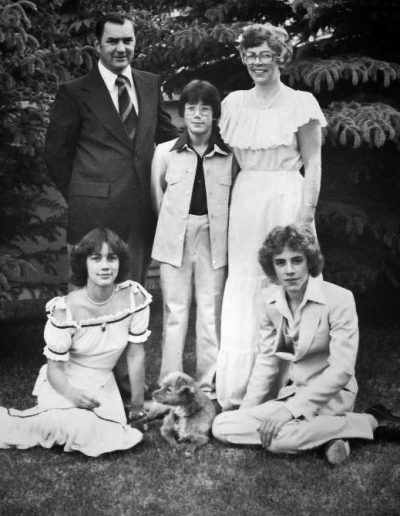
Her children did not stay where they grew up. My sister Bonnie traveled all over Africa and Europe and ran safaris and babysat orphaned gorillas (one of whom attacked her, when almost full size). Then she moved to California. But Mom and Dad see her a lot—perhaps more often than parents see their adult children if they do stay in the same community. They traveled to Norway with her, and to Africa, and had adventures there they would have otherwise foregone. I moved east, to Montreal, and Boston, and Toronto—thousands of miles away—but come back to Saskatchewan every summer, where my parents and my siblings have a cabin at a remote northern lake. Mom and Dad both got to know my kids very well, because of that, and I firmly believe that such intergenerational connection is vital. How else do you learn to travel through life, when you’re young? And I think my kids have some extra people to love, and that’s worth something. We’ve been very successful with that, too, on my wife’s family’s side.
We still spend a couple of weeks at the cabin, by the northern lake, in the summer, where it’s really a bit too cold to swim, but is peaceful and beautiful, and where you can water-ski, because you don’ have to get into the water slowly, and the lake is deep and clear and with a good sandy bottom.
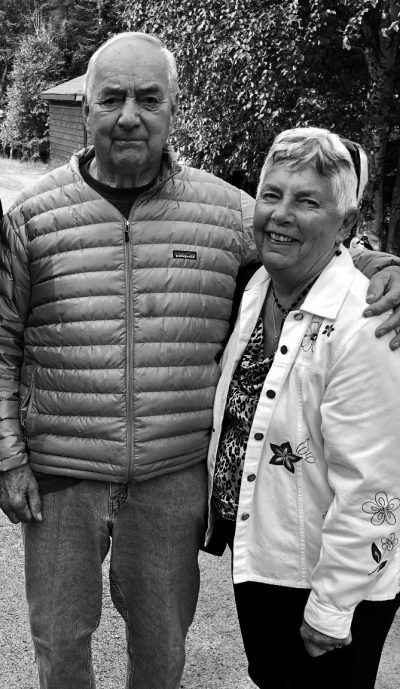
I see my parents at least one other time or more a year, and talk to them at least weekly by phone or FaceTime (when I remember that it exists). My brother, Joel, lives in Regina, and he travels up to the lake cottage frequently and maintains it and takes care of my parents, who are getting a bit older, shall we say, and need a bit more help (although not very much). So she encouraged her children to leave, to get out into the world, to have their lives and their separate families, to pursue their adventures, and she benefited from it, surprisingly enough, by staying more involved with their lives, in a manner everyone appreciated, than would have otherwise been the case.
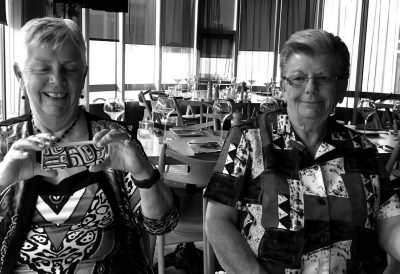
Last year, I took Mom and her sister Margaret to Iceland for two of the lectures I have been delivering on my last book, 12 Rules for Life. It was a good adventure for them. They made friends with the young and good-looking security service types who were ensuring my safety (unnecessary, but unobtrusive, good-spirited and professional). They shared in the excitement of the large lectures and the odd celebrity that accompanied the tour. It was a very good trip. They were happy to be invited, and good company, and no trouble. She’s always up for an adventure. A few years back, my son sang at Carnegie Hall with a choir from Toronto. Mom and Margaret attended that, too. My wife, Tammy, and sister, Bonnie, got up to some mischief and invited them both to a drag club at a Chinese restaurant (a combination only likely in New York). It was pretty risqué, by 1950’s women’s standards. The drag queen, a very large black guy, zeroed in on my mom. He told her that she was the whitest woman that he had ever seen (probably true, as she has snow-white hair and the pale skin of someone English who lives in northern Alberta). He accused her of making apple pies. He had her stand up in the middle of the show, and raked her over the coals a bit, in a good-natured manner. In truth, it was difficult to envision two more difficult people trying to communicate. But she laughed, and joked, and took it in good form, and admitted rather shame-facedly that she did make a mean apple pie, and it went over fine. My poor aunt, a bit more prudish than my mother, spent the entire evening with her jaw dropped literally fully open. That’s God’s honest truth. But she enjoyed it, too, and certainly hasn’t forgotten it.
That’s my mom. No trouble. Lots of fun. She is very emotionally stable and happy. That’s a wonderful temperament. She doesn’t complain, except sometimes, and then she has her reasons (and always feels guilty about it). She seriously loves her children, and doesn’t play favorites, although she has a soft spot for my younger brother, which is a bit comical and fine with the rest of us. She likes to have a glass of wine, and to play practical jokes, and is hospitable to a fault. There are always three meals prepared for guests at my mother’s house, or her cabin, or even when she’s visiting. She likes to be taken out for dinner, but doesn’t expect it. It’s easy to feel welcome when visiting her. This is a remarkable and underappreciated attribute. It’s what makes a house feel like a home. You’re welcome in her house. She takes care of you. It’s warm, and I think it’s much, much less common than it once was, now that so much resentment appears to have built up in the kitchen and the domestic sphere, where the increasingly common warfare between men and women and their respective duties means that the basic tasks of hospitality have been abandoned, where mealtimes are no longer collective acts of celebration but individual acts of self-interested grazing, and where people are chronically preoccupied with their individual electronic addictive social hells. Maybe that’s my own age speaking, but I can’t help but think that something crucial has been lost in the hunger for career and social accomplishment, and it’s home and the intense feeling of belonging somewhere that has gone by the wayside. I don’t think people can stand the isolation that loss has produced. But maybe that’s just sentimentality, as I consider this birthday and its particular significance.
And now my mother, Beverley Anne Peterson, is eighty. That’s just not young, no matter how you slice it. Her older sister, Joan, just passed away a couple of weeks ago, after a dreadful bout with Alzheimer’s (the same disease that took her mother, with equal horror). Her older brother, Earl, is showing some signs of cognitive decline and even Margaret, five years younger, has had some heart trouble. Many of her friends have died, and a larger number of them are in nursing homes, where they are starting to be truly old. Some no longer recognize her. It’s no picnic to get old. The world defies your hard-earned expectations. Your culture disappears. Your friends vanish. You lose your hearing (she’s a bit deaf now), and sometimes your sight (she’s fortunate there) and your mobility (no problems there, either, perhaps because of her habit of daily walking) and maybe a lot more than that. But she manages it with amazing grace, volunteering at the old folk’s home in her home town, maintaining an active social life with the friends she has left, as well as new ones she has cultivated, and traveling, a lot, to see my family and Bonnie and her husband and kids in California and spending summers in the cabin at the lake, where she is joined very frequently by her sister Margaret. She’s no damn victim, my mother, and does what she can, with conscious intent, to make the best of what is sometimes a difficult lot.
She’s nonplussed by her age; surprised that it arrived so soon; still feels like she did when she was, say, thirty or forty, and can’t believe that the time has been so evanescent and vanished so rapidly. Don’t be thinking that life is long. This is a warning to everyone young. The decades fly by with increasing speed as you march through the days and weeks of your life, and you are a fool to take anything for granted.
My Mom is a very good person. She’s honest, and lovable, and funny, and grateful. She tries hard to do her best. She has a soft heart, but didn’t take advantage of that to overprotect her kids. She has been married to my father, successfully, for more than fifty years, and that’s taken a lot of commitment and care and work, because it’s no simple matter to manage a negotiation for that many decades.
I love her a lot. I’m glad she’s still in good shape. It’s quite the miracle, as far as such things go. When she turned 75, my siblings and I took her and some other family members on an Alaskan cruise. That’s a very good thing to do with a family and with older people. You can spend as much time together as you want. You can dine together. There are things to do and, when you don’t want to do anything, you can watch the eternal ocean flow by. I hope we can think of something equally enjoyable and practical this time around, but not for a while, because I’m in Australia for the next month (among other complications).
I don’t just love her, either. I like her, too. She’s been a very good friend to me. I’m happy to know her, and always happy to see her. The last three years of my life have been filled with exceptional turmoil and a fair bit of health trouble, and she’s been around for more of that than you might think, along with my father. I think it’s made our relationship even better, and it was pretty damn good to begin with. She’s on my side, firmly, just like she has been with her other kids, and her friends, and the rest of her family. There’s something to be said for loyalty, hospitality and gratitude.
So, here’s to you, Mom. Happy Birthday. More power to you. I think you lived honorably and well and admirably and that the people who knew you well all loved and, just as importantly, respected you. I hope that God shines His grace on you for the next years of your life. I hope that I get to see you for some more good summers. May your spirit stay young and untrammeled. I hope that you and Dad keep contending successfully with one another, and stay together, and support one another, and keep the cords of your life tightly bound together. I hope the burdens of age don’t fall on you in too terrible a manner. May you have as many more birthdays as you want; that they are mercifully delivered; and that you are accompanied in your celebrations by the people whom you love and who love you. Thanks for all your support and your love and your belief in me (even when you had some reason to question that belief). It has made a tremendous difference in my life, and I am very grateful for who you are and who you have been for me and the rest of our family.